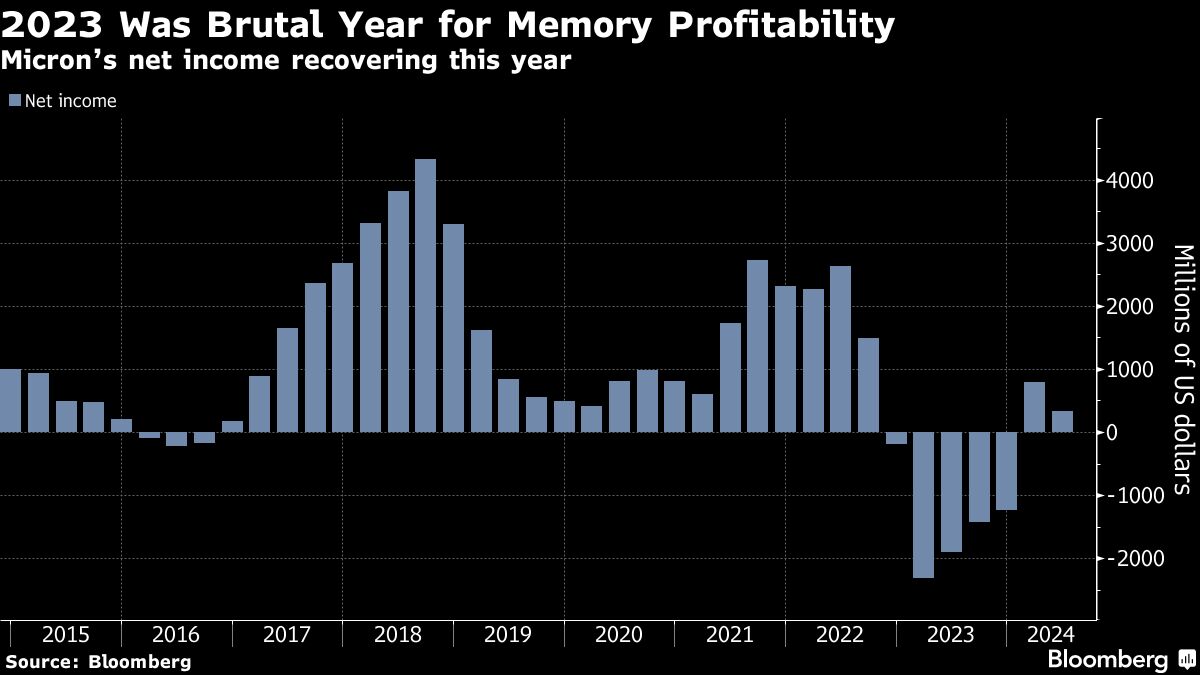Micron Gains Most in Six Months as AI Demand Bolsters Forecast

(Bloomberg) -- Micron Technology Inc., the largest US maker of computer memory chips, is on track to gain the most in six months after giving surprisingly strong sales and profit forecasts, helped by demand for artificial intelligence gear.
Most Read from Bloomberg
Fiscal first-quarter revenue will be about $8.7 billion, the company said in a statement Wednesday. That compares with an average analyst estimate of $8.32 billion. Profit will be about $1.74 a share, minus certain items, versus a projection of $1.52.
The rosy outlook is the latest sign that Micron is benefiting from a boom in AI spending. Orders for a type of product called high-bandwidth memory have added a lucrative new revenue stream for the company and other chipmakers. The technology helps develop AI systems by providing more rapid access to massive pools of information.
Demand has been outpacing supply, letting Micron boost prices and secure long-term guaranteed contracts. It’s already sold out of the product for 2024 and 2025, the company said Wednesday.
The shares rose about 15% to $110.60 in premarket trading on Thursday. If the gains hold, it will be the biggest intraday increase since March 21.
Results from Micron’s fiscal fourth quarter also handily beat estimates. Revenue increased 93% to $7.75 billion in the period, which ended Aug. 29. Excluding certain items, profit was $1.18 per share. On average, analyst had estimated a profit of $1.12 a share and revenue of $7.66 billion.
Micron has an edge because it’s the first chipmaker to reliably offer more advanced memory in high volumes, Executive Vice President of Operations Manish Bhatia said in an interview. With companies racing to beef up their AI software and hardware — and using more memory in the process — Micron is in a good position, he said.
The chipmaker also is emerging from a slowdown in demand for personal computers and smartphones, two of the biggest markets for memory. Device shipments are now growing again, Micron said. Those devices will increasingly feature AI functionality that requires more memory chips to work properly, adding a further benefit, Bhatia said.
Micron makes dynamic random access memory, or DRAM, a type of chip that temporarily holds information and works alongside processors from companies such as Nvidia Corp. and Intel Corp. It also make Nand flash memory — semiconductors that store information in everything ranging from data-center computers to smartphones.
“Robust AI demand drove a strong ramp of our data center DRAM products,” Chief Executive Officer Sanjay Mehrotra said in the statement. “We are entering fiscal 2025 with the best competitive positioning in Micron’s history.”
The company is one of only a handful that have survived the industry’s brutal boom-and-bust cycles over the devices. Those swings in demand have made it difficult maintain consistent profits, but the company has been emerging from the latest downturn. The chipmaker competes with South Korea’s Samsung Electronics Co. and SK Hynix Inc. in the memory market.
Most Read from Bloomberg Businessweek
©2024 Bloomberg L.P.
Breaking news
See all






